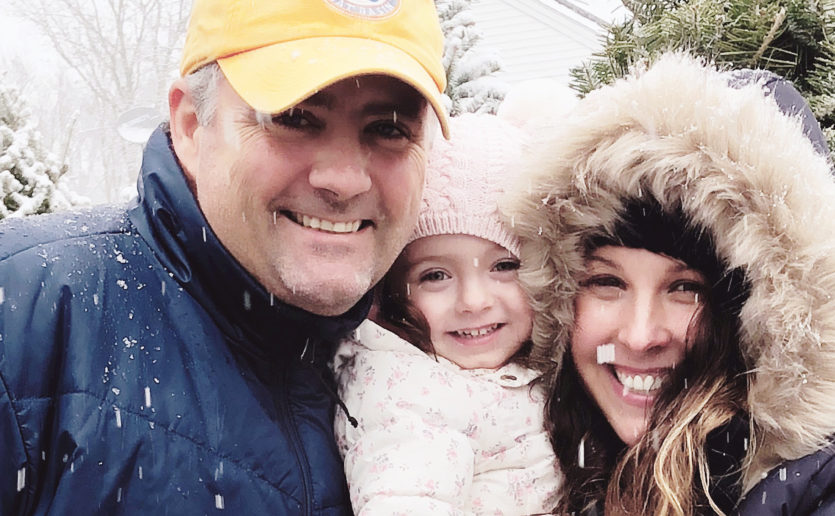 In the summer of 2014, Hillary Tufts, RN, who was 27 weeks pregnant, called the doctor because she was concerned about unexpected bleeding. After checking in with a nurse, Hillary was sent to the labor and delivery floor at Massachusetts General Hospital for a precautionary stress test. At the four-minute mark, her baby’s heartbeat started to plummet.
In the summer of 2014, Hillary Tufts, RN, who was 27 weeks pregnant, called the doctor because she was concerned about unexpected bleeding. After checking in with a nurse, Hillary was sent to the labor and delivery floor at Massachusetts General Hospital for a precautionary stress test. At the four-minute mark, her baby’s heartbeat started to plummet.
Hillary was rushed to the operating room for an emergency C-section. What happened while she was under anesthesia is remarkable.
When babies are born, doctors assign Apgar scores at one, five and 10 minutes of life to assess their physical condition and transition to life outside the womb. Babies with Apgar scores closest to 10 tend to be healthier and scores often increase as time passes. For baby Shea Tufts, born 27 weeks prematurely and weighing just 1.2 lbs., her scores were one, one and one at each of these check points.

Twelve Harrowing Minutes
For 12 harrowing minutes, the Neonatal care team performed cardiopulmonary resuscitations (CPR) on Shea’s tiny body – and still no heartbeat. When there seemed to be no hope, one of the doctors placed an ultrasound against Shea’s chest. To everyone’s surprise, she had a heartbeat, but it was barely visible. The team resumed CPR for an additional four minutes before Shea’s heart was miraculously strong enough to beat on its own.
Hillary’s husband, Mike, sat in the waiting room for almost two hours, unsure of what the future would hold.
The tumultuous entrance into the world was just the beginning of Shea’s amazing journey. For the first few days of her life, Shea was placed on a breathing tube, an umbilical cord IV, various heart medications, and a feeding tube. She also had several blood transfusions. She was also diagnosed with hypothyroidism (underdeveloped thyroid gland), coagulopathy (when blood does not clot properly), a brain hemorrhage and heart defects. After 17 days, she came off several medications and IV fluids. She had good days and setbacks. By 83 days, she had successfully learned how to eat and take all medications by mouth.
“They kept Shea in their hearts and minds even after we went home,” Hillary Tufts said.
“We were in the Neonatal Intensive Care Unit (NICU) for a total of 93 days, and it was about 40 days before things really started to even out for her,” said Hillary, who is a nurse in Dermatology at Mass General. “Parents who don’t experience the preemie world really have no way to relate to it directly. It is a difficult thing to comprehend as a parent, to see your tiny child struggle and fight to live minute by minute and day by day.”
Exceptional Neonatal Care
The care team also helped keep the Tufts family grounded and provided incredible advice and guidance. “They kept Shea in their hearts and minds even after we went home,” Hillary Tufts said. “We will never forget the day that Dr. Sara Bates and nurse Susan Carver discharged us from the NICU and sent us home with Shea. It was an emotional journey to get to that point, and we were overcome with joy, as was the staff.”
After her discharge from NICU, Shea transitioned to the Newborn Developmental Follow-Up Clinic at MGHfC, where Leslie Kerzner, MD, director of the clinic, joined her care team. At the clinic, Kerzner and her colleagues were amazed at Shea’s progress and celebrated every milestone, no matter how big or small. The Newborn Developmental Follow-Up Clinic provides comprehensive assessment services to at-risk infants from birth through age 2 years, helping the community pediatricians to navigate ongoing issues of prematurity.

“Dr. Kerzner and her colleagues always gave us such positive feedback. My husband and I could see that Shea got so much out of her visits to the clinic,” said Hillary. “This tiny preemie toddler was so proud of herself when she could pass a cognitive test or show off a motor skill for Dr. Kerzner. The clinic provided a level of extended care and extremely important insights for us as parents, which kept us focused on the most important aspects of Shea’s continuing development. These insights have paid huge dividends for Shea.”
Motivation and Hope
Now, at 4 years old, Shea is a happy, energetic preschooler who loves school, swimming, gymnastics and family game nights. She is small for her age, but the care team is confident she will catch up over time. “Shea knows how to eat and get dressed, and her vocabulary is incredible” said Hillary. “She is also looking forward to her new role as a big sister this coming February!”
Although preemies tend to be small, they are strong, and Shea is truly a testament to that. “When I think of Shea, I am so humbled and in awe of how resilient she and other preemies are,” said Dr. Kerzner. “She gives me motivation and hope for caring for other tiny babies. This is what sticks with me over the years.”
To learn more about how you can support MassGeneral Hospital for Children, please contact us.

